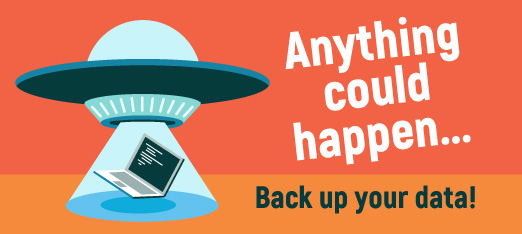
Our lives aren't just physical - they're digital. From social media posts to photos saved on our desktops, we live through our computers every day. What happens when that online life disappears?
Phishing attacks, ransomware, computer viruses, theft, physical damage, and a simple hard drive crash could erase that life permanently. Are you prepared to rebuild everything from scratch?
If you have a backup, you won't need to. Adequately backing up your electronic files and documents ensures that if your online life disappears, it can be restored at the click of a button. With the recent onslaught of computer security attacks, backup management is even more critical so we can recover from loss and preserve our digital heritage.
What is a backup?
A backup is a copy of all your electronic files and folders, saved in one or more separate locations off your computer, tablet, or phone. A backup ensures that if something happens to your device, your information is safe and can be easily restored.
Why do I need a backup?
Think of how much information you store on your computer, tablet, or phone every day. Storing your information on one device creates a single point of failure, which means if that device is compromised, your entire digital life is compromised.
Keep in mind that:
- one laptop is stolen every 53 seconds1;
- 70 million smartphones are lost every year2;
- the average lifespan of a hard drive is three to five years3;
- 30% of people have never made a backup4.
If your device is suddenly lost, stolen, damaged, or targeted by an online attack, and you don't have a backup, you will lose everything. Regularly maintaining a backup keeps your digital work and memories alive.
How do I make a backup?
You have three options for making a backup:
- Back up to an encrypted external hard drive
- You can find instructions on the World Backup Day website.
- Back up to an online cloud storage system
- Your University of Alberta Google account has secure backup management embedded into the service
- Store your data on a university file-share that embeds secure backup management
- Check with IST or your local IT to ensure the file-share has adequate and appropriate secure backup management in place.
How often should I back up my files?
That depends on you and your usage. How often do your files change? A designer who creates new graphics for clients every day may want to back their work up at the end of each workday. A student who loads a thesis paper to their hard drive may want to back it up right away due to the importance of the project.
You have to decide how often to back up your files. But the most important thing is to create a regular backup schedule and stick to it.
1 Kensington Computer Products Group. https://www.kensington.com/ce/ca/home
2 Kensington Computer Products Group. https://www.kensington.com/ce/ca/home
3 BackBlaze. https://www.backblaze.com/blog/how-long-do-disk-drives-last/
4 BackBlaze. https://www.backblaze.com/blog/the-survey-says-apathy-is-winning/